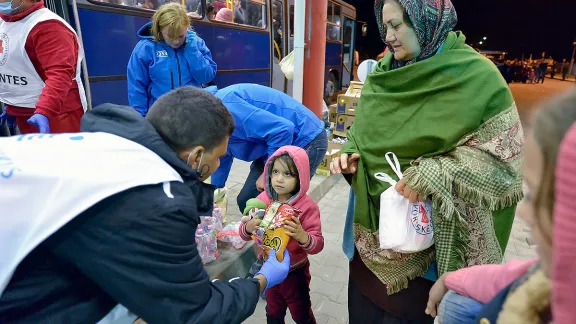
Staff from ACT Alliance member Hungarian Interchurch Aid offer food to a young refugee at Beremend, along Hungary's border with Croatia. Hundreds of thousands of refugees and migrants flowed through Hungary in 2015 on their way to western Europe from Syria, Iraq and other countries. Photo: Paul Jeffrey/ACT
International conference on public theology and dialogue between cultures
(LWI) - A global conference bringing together church leaders hopes to find ways to counter growing populist movements that promote racism and hate crime.
“Nationalist populist movements have become powerful political actors that divide the public sphere,” Rev. Dr Simone Sinn, Study Secretary for Public Theology and Interreligious Relations of the Lutheran World Federation says.
“Populist discourse and policies create exclusion and marginalization. Against political strategies that are driven by hate and fear, churches need to actively engage and advocate for respecting the dignity of all and acknowledging diversity in society. As Christians we can provide a forum for dialogue between different cultures and social locations.”
A conference held in Berlin, Germany, from 2 to 4 May titled “Churches as Agents for Justice and against Populism – Public Theology in Global Intercontextual Dialogue” takes up these concerns. LWF, the Protestant Academy Berlin, Bread for the World and the Church of Sweden have partnered for this event. It brings together theologians, church leaders and political scientists from 25 countries.
“The conference aims to examine the mechanics of exclusionary populist movements and to discuss theological perspectives on the church’s role in the public sphere. Through the conversation between people from different churches across the globe we want to strengthen the commitment to overcome xenophobia and racism, especially against refugees and migrants and encourage participatory processes in church and society,” explains Dr Sinn.
Livestream on “The Church in Times of Populism”
Part of the conference will also be a public panel held on 2 May from 18:00 to 20:00 CET which LWF will livestream on the LWF Facebook page. The Church of Sweden’s Archbishop and LWF Vice-President for the Nordic Region, Dr Antje Jackelén, as well as the Chair of the Council of the EKD and Bishop of the Evangelical Lutheran Church in Bavaria, Prof Dr Heinrich Bedford-Strohm, will give inputs on the subject, “The Church in Times of Populism” before entering a discussion with the public.
“Polarization, populism, protectionism and post-truth currently have a noticeable influence in our countries,” says Archbishop Jackelén. “We have to stand up to those four ‘P’s – which also means that we will have to face the pain caused by our own wounds as well as the pain of others wounds.”
Following up on the study process “The Church in the Public Space”
Archbishop Jackelén, as well as Dr Sinn, were part of the study group that worked on the document “The Church in the Public Space” which was published by LWF in 2016. The conference in Berlin now follows up on the insights gained in this process.
One of its chapters the study document formulates “The ABCDE of the Church’s Engagement in the Public Space”. They are: assessing public issues in participatory ways, building relationships of trust, challenging injustice, discovering signs of hope, and empowering people in need. These five key activities were reiterated in a public statement adopted by the LWF Council at its meeting in Wittenberg in 2016.
Watch the announcement: Churches as Agents for Justice and against Populism


